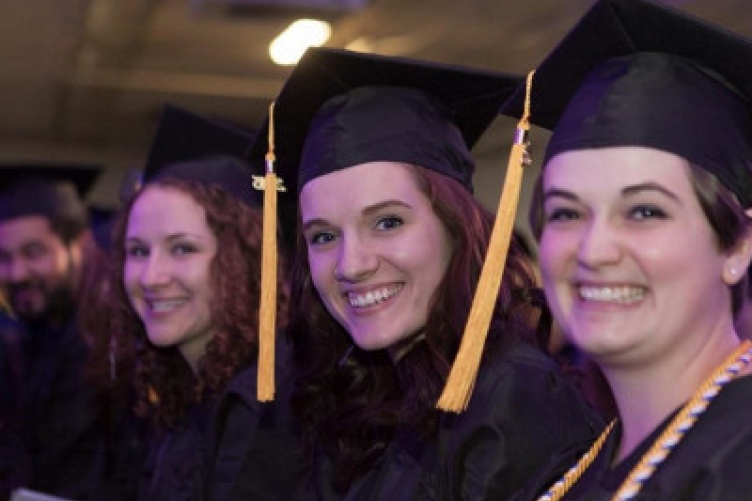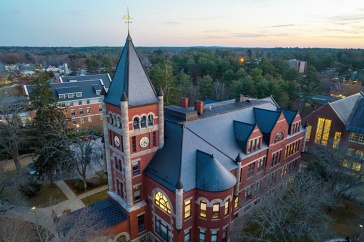
ASL/English Interpreting alumna Shayla Radcliffe, center, at UNH Manchester's commencement ceremony in 2015.
After graduating from Alvirne High School, Shayla Radcliffe (Gannon) ’15 decided to pursue a teaching program at Manchester Community College. She attended teacher preparation courses for a year and half before realizing she wanted a different career choice. An introductory American Sign Language (ASL) course inspired her to change course, landing her in the ASL/English Interpreting program at UNH Manchester.
Fast forward to today, Radcliffe is working as an interpreter for The Children’s Center for Communication – Beverly School for the Deaf. We caught up with Radcliffe to learn about her career, and the experiences that led her to where she is today.
What was the most rewarding part of your UNH Manchester experience?
The professors and mentors I had during my time in the program were so giving, knowledgeable, understanding and nurturing. I wish I had realized during my time there just how lucky I was to have such experienced people in my life giving so much of themselves to help prepare me to be a positive piece of our community.
What real-world experience did you get as a student?
During my senior year in the ASL/English Interpreting program, I was partnered with interpreter mentors as well as Deaf mentors. Being paired with mentors was helpful in so many ways: exposure to language, experiencing the day-to-day ethical decisions that are made in this career, making connections within the community—overall building a comfort with the kinds of settings that I otherwise was inexperienced with.
What were you doing 1 year out of college?
After graduating from UNH Manchester, I started working as a teaching assistant at The Learning Center for the Deaf. I felt that I had received a good foundation from my time at UNH Manchester working with professors, mentors and peers, but I needed to build upon that on my own. The time I spent in that job, though I wasn't working as an interpreter, had an immensely positive impact on the trajectory of my career. With a career like interpreting, you're told repeatedly throughout your college years that no amount of class time will make a good interpreter. You need to go out into the community and socialize, make connections and learn ASL through natural language acquisition. It was my mission after graduation to put those words into action and immerse myself in the community. I'm grateful that I made that choice. I can speak from experience when I say that language immersion truly is the best way to improve your receptive, expressive and vocabulary.
What are you doing now?
I'm currently coming up on four years post-graduation - wow, time flies. I have since started working at The Children’s Center for Communication – Beverly School for the Deaf and, after having passed my Educational Interpreter Performance Assessment (EIPA), am currently working as a staff interpreter. My next goal is to become a nationally certified interpreter. I've met and worked with so many amazing people since my time at UNH Manchester and am grateful to have a career that provides me with a variance in my day-to-day work.
How do you feel your time at UNH has had an impact on where you are today?
Without my time at UNH, I wouldn't have received the foundational language skill or interpreting knowledge that I needed to build the rest of my career. My college experiences helped provide me with the background information that I needed to make sense of the incidental learning experiences that are provided to me through my work. While I'm still nowhere near done building my career as an interpreter, I feel proud of the progress that I've made since graduation.
If you could give one bit of advice to incoming UNH Manchester students, what would it be?
My advice for incoming UNH Manchester students is to take advantage of the many resources that are made available to you during your college years. There is a lot to take in, and often as we transition into college, we are so overwhelmed by everything happening so fast and following society's timeline that there are vital experiences and information that we might overlook as we set our sights on that gold and glittery graduation day. In the interpreting program specifically, we were often told about different events and experiences we should have during our time in school, and it was easy to say, "I have [work, homework, plans, etc.] I can't make that work." Make it work. There's a reason your professors are encouraging you to do it, and after graduation you might feel you've lost a connection that you once took for granted.
Any other thoughts you’d like to share?
If you asked me in high school what I was going to do after graduation, my answer likely would have been something that revolved around being a teacher. After taking time to explore that realm, I realized it was not the path that I wanted to continue and conjured up a new plan for my future. It's okay to change your mind, it's okay to start something new. Changing a major and starting a new four-year program might feel like you're setting yourself back compared to everyone else's timeline, or like those first years spent in another major are now "a waste." It's important to know that while your credits might not have transferred the way you've wanted, you still have a valuable experience that changed the trajectory of your life.

















































